牛津译林版(2019)必修 第二册Unit 3 Festivals and customs Grammar and usage课件(共24张PPT)
文档属性
| 名称 | 牛津译林版(2019)必修 第二册Unit 3 Festivals and customs Grammar and usage课件(共24张PPT) |
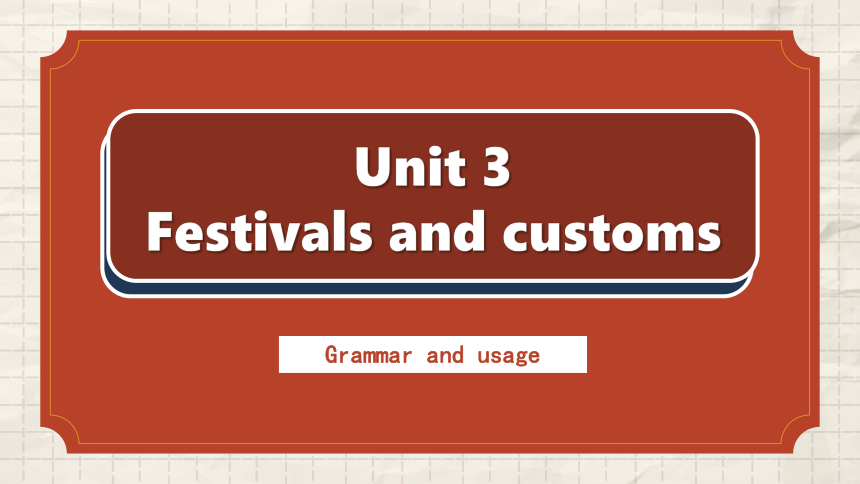
|
|
| 格式 | pptx | ||
| 文件大小 | 1.3MB | ||
| 资源类型 | 教案 | ||
| 版本资源 | 牛津译林版(2019) | ||
| 科目 | 英语 | ||
| 更新时间 | 2024-09-07 00:00:00 | ||
图片预览

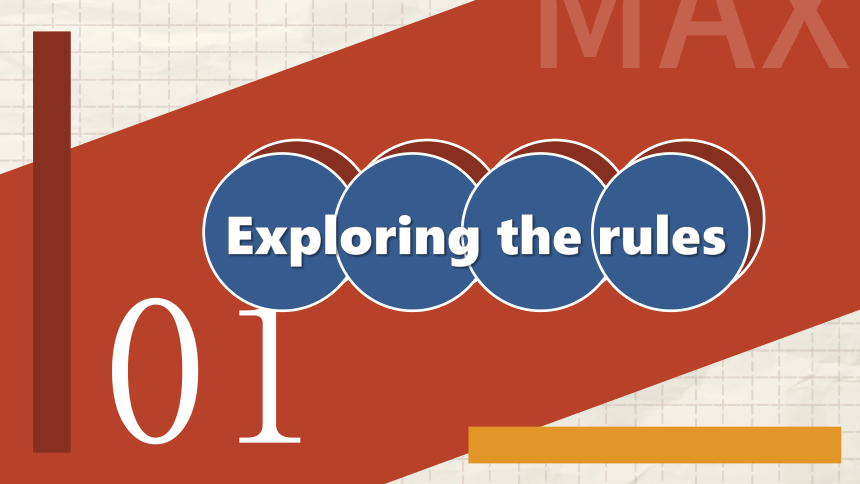
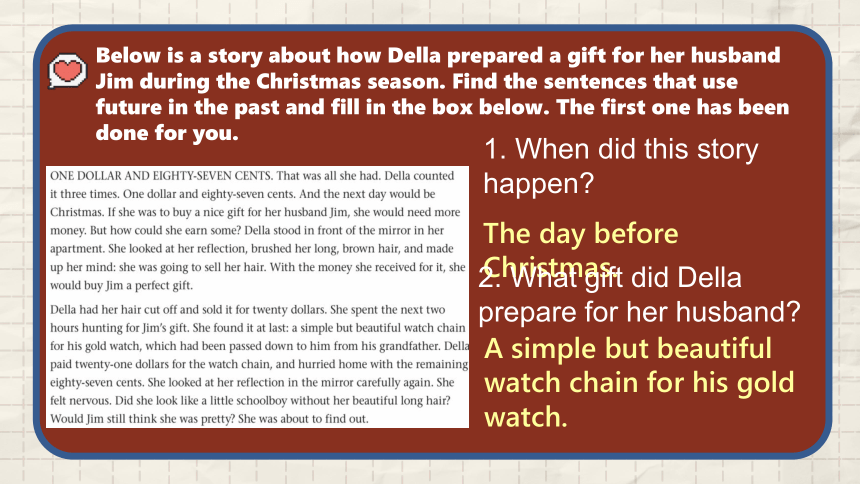
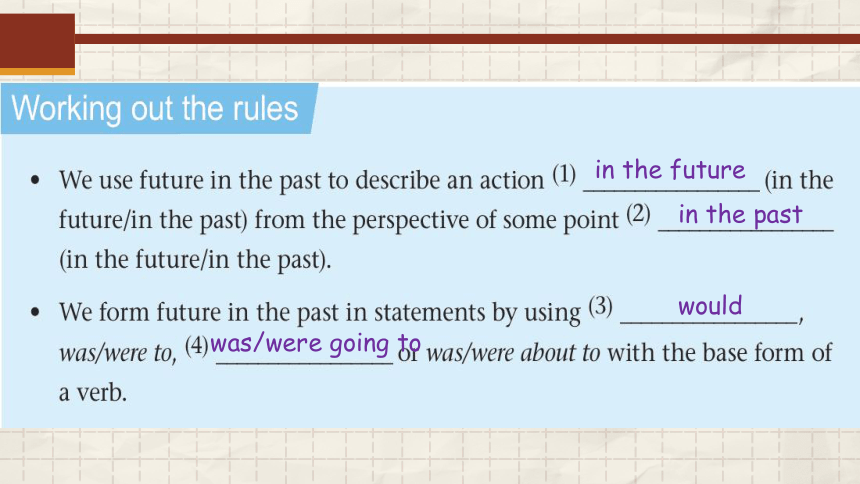

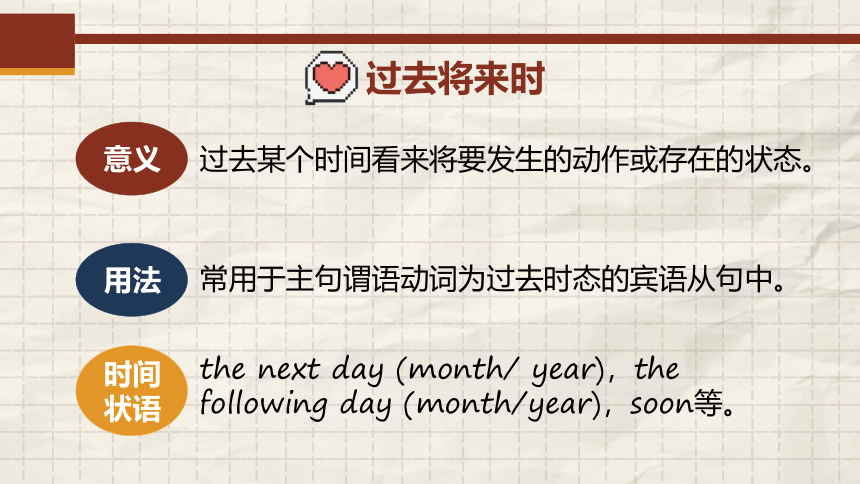
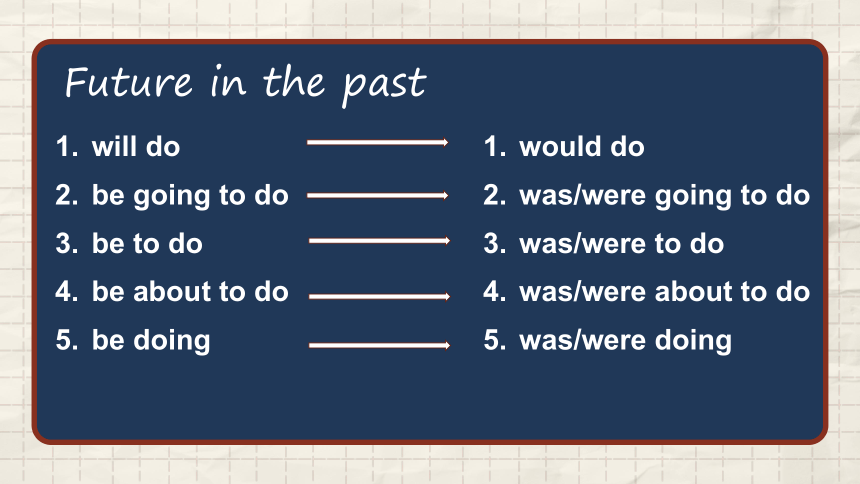
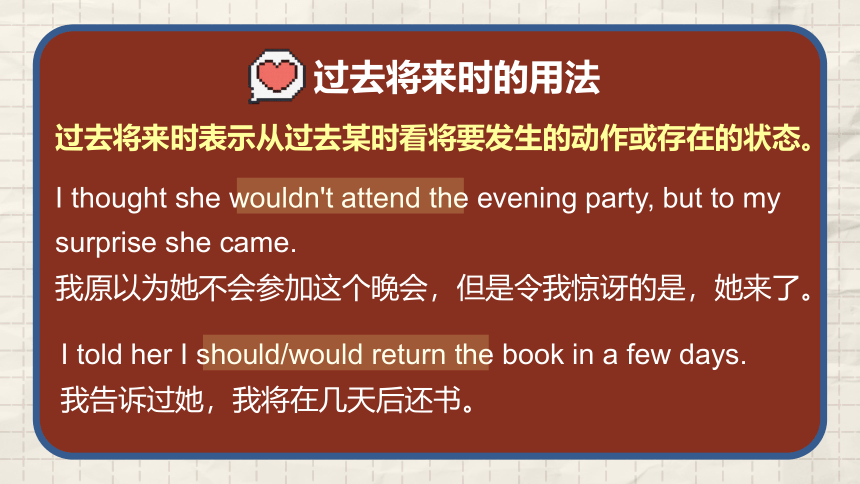

文档简介
(共24张PPT)
Grammar and usage
Unit 3
Festivals and customs
01
标
题
内
容
Exploring the rules
Below is a story about how Della prepared a gift for her husband Jim during the Christmas season. Find the sentences that use future in the past and fill in the box below. The first one has been done for you.
1. When did this story happen
The day before Christmas.
2. What gift did Della prepare for her husband
A simple but beautiful watch chain for his gold watch.
in the future
in the past
would
was/were going to
02
标
题
内
容
Past Future Tense
过去将来时
意义
过去某个时间看来将要发生的动作或存在的状态。
用法
常用于主句谓语动词为过去时态的宾语从句中。
时间状语
the next day (month/ year),the following day (month/year),soon等。
Future in the past
will do
be going to do
be to do
be about to do
be doing
would do
was/were going to do
was/were to do
was/were about to do
was/were doing
过去将来时的用法
过去将来时表示从过去某时看将要发生的动作或存在的状态。
I thought she wouldn't attend the evening party, but to my surprise she came.
我原以为她不会参加这个晚会,但是令我惊讶的是,她来了。
I told her I should/would return the book in a few days.
我告诉过她,我将在几天后还书。
过去将来时的表示方法
1. would/should+动词原形,would用于所有人称,should只用于第一人称。
She told us that she would not go with us, if it rained.
她告诉我们,如果下雨的话她就不和我们一起去了。
I telephoned him yesterday to ask what I should do next week.
我昨天给他打电话问我下周做什么。
“would+动词原形”也可表示过去经常性、习惯性的动作。
When I was small, my mum would read me stories at night.
在我小的时候,妈妈常在晚上给我讲故事。
过去将来时的表示方法
2. was/were going to do表示过去打算/计划做某事或客观迹象表明要发生的事。
I was going to see Mr Brown the next day, but the appointment was cancelled.
我本打算第二天去看布朗先生的,但预约被取消了。
I thought it was going to rain.
我想是要下雨了。
过去将来时的表示方法
3. was/were about to do表示过去正要/即将做某事,一般不与时间状语连用。
When I got there they were about to leave.
我到那里的时候他们正要离开。
“sb. be about to do… when…”句型表示“某人正要做某事,这时(突然)……”。
I was about to leave when someone knocked at the door.
我正要离开,突然有人敲门。
过去将来时的表示方法
3. was/were to do表示过去计划或安排将要做某事。
She said he was to finish the work in a week.
她说她打算一星期后完成这项工作。
4.当was/were + doing用于过去将来时时,仅限于go, come, leave, start, take off等趋向性(短语)动词。
David was leaving for Shanghai in a few days.
戴维几天以后要去上海。
03
标
题
内
容
Applying the rules
B1
Complete the conversations with the correct expressions in the brackets.
visited
was going to see
B1
Complete the conversations with the correct expressions in the brackets.
are going to hand in
haven’t started
would work on
was about to start
came
B2
Below is a story about Jim's gift for plete the story with the correct verbs in the box below, using future in the past. Some verbs can be used more than once.
would be
was going to make/would make
B2
Below is a story about Jim's gift for plete the story with the correct verbs in the box below, using future in the past. Some verbs can be used more than once.
would sell/ was going to sell
would be/were going to be
was going to think/ would think
04
标
题
内
容
Language Points
earn
vt.&vi. 赚得;获利;赢得
earn sb. sth. 为某人赢得某事/物; 为某人带来某事/物
earn a living (make a living) by... 靠……谋生
earn a fame/a reputation 赢得名誉
earnings n.收入, 所得; 工资, 报酬
练习:He is satisfied with his _________(earn) as a civil servant.
earnings
hunt
vt.&vi. 寻找;打猎
hunt for 寻找,搜寻
hunt out 找出,搜寻出
hunter n.猎人
练习:In the school library he hunted _________ books on politics.
out
promote
vt.&vi. 寻找;打猎
promote sb. to... 提升某人为……
promotion n.
[C,U]晋升,提升;促销活动;[U]促进
It has long been known that regular exercise can promote all-round health.
经常锻炼能促进全面健康,这一点已久为人知。
observe
vt.庆祝,庆贺
vt. & vi.观察,监视,注视;观察到
observe+从句 观察……
observe sb. doing sth.
观察到/看到某人正在做某事(强调动作正在进行)
observe sb. do sth.
观察到/看到某人做某事(强调动作发生的全过程)
observe the law 遵守法律
observe the local customs 遵循当地习俗
The police observed him driving at 90 miles per hour.
警察发现他正以90英里的时速驾车。
honour
n. 尊敬,尊重
vt.尊敬,尊重(某人)
in honour of sb./sth.(=in sb.'s/sth.'s honour) 为向……表示敬意
have the honour of (doing) sth. 得到某殊荣,有幸做某事
It is an honour (for sb.)to do... (对某人来说)做……是种荣幸。
honour sb. with sth.
某事使某人感到荣幸/给予某人表扬(或奖励、头衔、称号)
be/feel honoured to do sth. 做某事感到荣幸
The stadium was named in honour of the club's first chairman.
为了纪念俱乐部的第一任主席,该体育馆以他的名字命名。
节
日
P
P
SEE
YOU
NEXT
TIME
Grammar and usage
Unit 3
Festivals and customs
01
标
题
内
容
Exploring the rules
Below is a story about how Della prepared a gift for her husband Jim during the Christmas season. Find the sentences that use future in the past and fill in the box below. The first one has been done for you.
1. When did this story happen
The day before Christmas.
2. What gift did Della prepare for her husband
A simple but beautiful watch chain for his gold watch.
in the future
in the past
would
was/were going to
02
标
题
内
容
Past Future Tense
过去将来时
意义
过去某个时间看来将要发生的动作或存在的状态。
用法
常用于主句谓语动词为过去时态的宾语从句中。
时间状语
the next day (month/ year),the following day (month/year),soon等。
Future in the past
will do
be going to do
be to do
be about to do
be doing
would do
was/were going to do
was/were to do
was/were about to do
was/were doing
过去将来时的用法
过去将来时表示从过去某时看将要发生的动作或存在的状态。
I thought she wouldn't attend the evening party, but to my surprise she came.
我原以为她不会参加这个晚会,但是令我惊讶的是,她来了。
I told her I should/would return the book in a few days.
我告诉过她,我将在几天后还书。
过去将来时的表示方法
1. would/should+动词原形,would用于所有人称,should只用于第一人称。
She told us that she would not go with us, if it rained.
她告诉我们,如果下雨的话她就不和我们一起去了。
I telephoned him yesterday to ask what I should do next week.
我昨天给他打电话问我下周做什么。
“would+动词原形”也可表示过去经常性、习惯性的动作。
When I was small, my mum would read me stories at night.
在我小的时候,妈妈常在晚上给我讲故事。
过去将来时的表示方法
2. was/were going to do表示过去打算/计划做某事或客观迹象表明要发生的事。
I was going to see Mr Brown the next day, but the appointment was cancelled.
我本打算第二天去看布朗先生的,但预约被取消了。
I thought it was going to rain.
我想是要下雨了。
过去将来时的表示方法
3. was/were about to do表示过去正要/即将做某事,一般不与时间状语连用。
When I got there they were about to leave.
我到那里的时候他们正要离开。
“sb. be about to do… when…”句型表示“某人正要做某事,这时(突然)……”。
I was about to leave when someone knocked at the door.
我正要离开,突然有人敲门。
过去将来时的表示方法
3. was/were to do表示过去计划或安排将要做某事。
She said he was to finish the work in a week.
她说她打算一星期后完成这项工作。
4.当was/were + doing用于过去将来时时,仅限于go, come, leave, start, take off等趋向性(短语)动词。
David was leaving for Shanghai in a few days.
戴维几天以后要去上海。
03
标
题
内
容
Applying the rules
B1
Complete the conversations with the correct expressions in the brackets.
visited
was going to see
B1
Complete the conversations with the correct expressions in the brackets.
are going to hand in
haven’t started
would work on
was about to start
came
B2
Below is a story about Jim's gift for plete the story with the correct verbs in the box below, using future in the past. Some verbs can be used more than once.
would be
was going to make/would make
B2
Below is a story about Jim's gift for plete the story with the correct verbs in the box below, using future in the past. Some verbs can be used more than once.
would sell/ was going to sell
would be/were going to be
was going to think/ would think
04
标
题
内
容
Language Points
earn
vt.&vi. 赚得;获利;赢得
earn sb. sth. 为某人赢得某事/物; 为某人带来某事/物
earn a living (make a living) by... 靠……谋生
earn a fame/a reputation 赢得名誉
earnings n.收入, 所得; 工资, 报酬
练习:He is satisfied with his _________(earn) as a civil servant.
earnings
hunt
vt.&vi. 寻找;打猎
hunt for 寻找,搜寻
hunt out 找出,搜寻出
hunter n.猎人
练习:In the school library he hunted _________ books on politics.
out
promote
vt.&vi. 寻找;打猎
promote sb. to... 提升某人为……
promotion n.
[C,U]晋升,提升;促销活动;[U]促进
It has long been known that regular exercise can promote all-round health.
经常锻炼能促进全面健康,这一点已久为人知。
observe
vt.庆祝,庆贺
vt. & vi.观察,监视,注视;观察到
observe+从句 观察……
observe sb. doing sth.
观察到/看到某人正在做某事(强调动作正在进行)
observe sb. do sth.
观察到/看到某人做某事(强调动作发生的全过程)
observe the law 遵守法律
observe the local customs 遵循当地习俗
The police observed him driving at 90 miles per hour.
警察发现他正以90英里的时速驾车。
honour
n. 尊敬,尊重
vt.尊敬,尊重(某人)
in honour of sb./sth.(=in sb.'s/sth.'s honour) 为向……表示敬意
have the honour of (doing) sth. 得到某殊荣,有幸做某事
It is an honour (for sb.)to do... (对某人来说)做……是种荣幸。
honour sb. with sth.
某事使某人感到荣幸/给予某人表扬(或奖励、头衔、称号)
be/feel honoured to do sth. 做某事感到荣幸
The stadium was named in honour of the club's first chairman.
为了纪念俱乐部的第一任主席,该体育馆以他的名字命名。
节
日
P
P
SEE
YOU
NEXT
TIME
